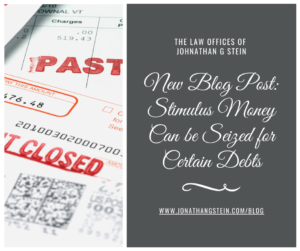
The most recent round of stimulus checks is being deposited into accounts for those qualifying Americans. Many are looking forward to using the money to pay off bills, pay down debt, and spend some money to “stimulate” the economy. And while the past COVID-19 relief packages have protected the stimulus payments from being seized by debt collectors, the most recent round is different. There are circumstances where your stimulus can and cannot be taken in this round—understanding your debt and how debt collectors work can be vital in understanding your situation.
Because stimulus money is not counted as income, the money cannot be included as income on a bankruptcy settlement; therefore, it will not be considered in calculating disposable income or monthly payment. The IRS will also not seize your money if you owe tax debt. But they also will not deposit your stimulus in the account you pay your tax debt from, so expect a paper check unless you have an account you file from separately. And finally, Federal student loan debt payments and interest are postponed until September 2021. Beware, though; if you have private student loans, you are still responsible for those payments.
As with private student loans, if you have wage garnishments, the stimulus is not protected from being seized. Those garnishments already on your accounts will be honored. But those are not the only ways your stimulus will not end up in your bank account. If you have outstanding child support, your stimulus will be garnished. There is no waiver for financial hardship. If you have a negative balance in your bank account, your bank will use the stimulus deposit to correct the overdraft and any associated fees. Having your stimulus seized is not ideal for anyone, but there are no options to stop these garnishments in these situations.
The good news is that your funds cannot automatically be diverted to pay that debt if you have debt in collection. But if a debt collector receives a judgment again you, your bank account will be garnished to pay off those debts.
You must understand your debt situation to the fullest to effectively manage it. With the federal government, thus far, not protecting your stimulus checks from garnishments, knowledge is the best way of protecting yourself.
If you are concerned about your stimulus being taken or have any issues with debt collectors, contact me at 916.247.6868. I will happily look over your situation and give you a free consultation. Managing your debt might seem stressful, but working together can protect your stimulus payment.
